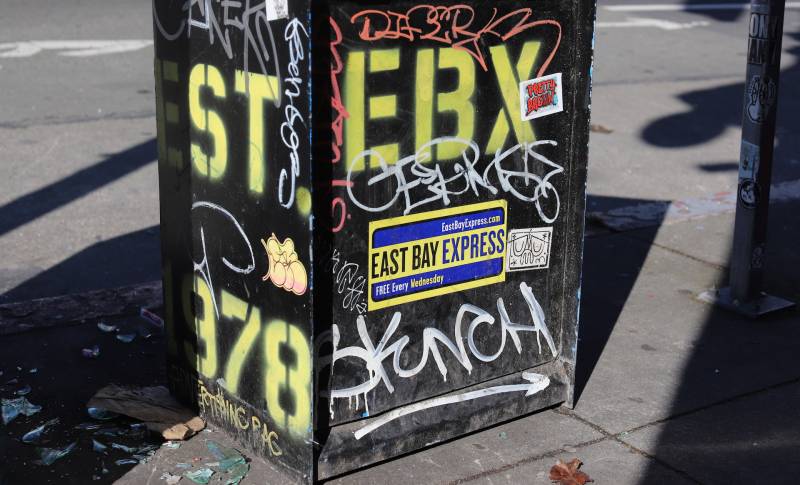In response to how the East Bay Express might fit into the East Bay’s media landscape, Pulcrano sought to highlight the paper as an independent alternative.
“So you’ve got hedge-fund journalism and corporate journalism,” he said. “We’re independent, funded by the community and its businesses,” without “big money pulling the purse strings.”
(“Corporate” is a “gross mischaracterization of Berkeleyside and its revenues,” Frances Dinkelspiel, editor and co-founder of Berkeleyside, said in a statement. Readers and local advertisers fund 95 percent of the business, Dinkelspiel said, adding Google has no role in Berkeleyside’s editorial operations.)
But in page count and staff, the Express is a shadow of its former self, with controversy still fresh in the minds of many East Bay community members. It’s not easy to find a distribution box in downtown Oakland, let alone one carrying the latest issue. Pulcrano said he anticipates content-sharing between Weeklys titles, but shared few details about staff additions. The Express currently relies on freelancers for content.
Pulcrano called the East Bay “talent rich,” saying he’s already heard from former contributors about rejoining the paper, but is deferring hiring decisions while the economy sputters. “It’s difficult to give firm numbers because we’re operating in the middle of a crisis,” he said.
The Express laid off most of its editorial staff last year after losing a lawsuit to a former sales and marketing director, Terry Furry, who alleged he was illegally denied overtime. An appellate court awarded Furry $750,000. Robert Gammon, the longtime editor in chief, shortly thereafter left the Express to work as communications director for California State Sen. Nancy Skinner.
The layoffs came less than a year after a controversy that still clings to the paper. In 2018, Stephen Buel, the outgoing editor and publisher who owned the paper with his wife, Judith Gallman, unilaterally retracted web posts he described as “racist against white people,” in a meeting, staffers present said. He also used a racial slur in the meeting, prompting some writers to quit in protest.
(Full disclosure: I worked as an Express editor, columnist and freelance contributor at different times between 2012-2018. I stepped down as columnist in 2018 during the controversy.)
Buel, who declined an interview request, issued an apology at the time, but accusations of sexism, including non-consensually kissing a former coworker in 2009, soon followed. Buel resigned temporarily; he returned as publisher, and then editor, out of what he called business necessity.
Buel will continue as contractor and interim editor during the transition. Oakland and Alameda magazines, which Buel runs with Gallman, were not a part of the Express sale to Weeklys.
Former Express associate editor Azucena Rasilla, who resigned after Buel retracted her stories and now works as a freelance journalist, considers the paper’s reputation damaged beyond repair. Buel remaining on as editor, even temporarily, is a poor start to mending community ties, she said.
“Some people might have forgotten what transpired, but faithful readers haven’t,” Rasilla said.
Asked about restoring goodwill, Pulcrano said in a statement that he intends to build a fresh editorial organization at the Express. “I know that [Buel] is looking forward to other challenges, so I believe his current role will be a temporary one,” he added.
Sale negotiations started two months ago, before the spread of the novel coronavirus hobbled the already-beleaguered alternative press on the West Coast. The Portland Mercury and The Stranger in Seattle this month furloughed staff and suspended printing as advertising revenue from the largely dormant nightlife and restaurant industries dropped by as much as 90 percent.
The ad sales slowdown gave Pulcrano pause. “But we’re seeing strong support from the community, and records in online activity because we’re doing some important reporting,” he said, mentioning Metro Silicon Valley’s coverage of coronavirus testing in Santa Clara County.
Pulcrano’s titles also include community broadsheets such as Gilroy Dispatch, Morgan Hill Times and Hollister Free Lance, wine and cannabis publications and several visitors guides.
Pulcrano also published the Oakland alt-weekly Urbanview until shortly after the national chain New Times Media bought the Express in 2001. (Buel and other local investors acquired the Express in 2007, touching off several more ownership changes in the following years.)
“New Times basically shoved us out of the market, so after they sold to locals and the locals decided to sell, it created this opportunity,” he said. “I enjoyed running the weekly in Oakland.”
Pulcrano argued that free weekly papers, despite the demise of nationally-recognized titles such as The Village Voice and San Francisco Bay Guardian, have fared better than dailies in recent years. “But coronavirus clearly threw us a new curve, it was completely unexpected,” he said. “It’s hitting the events, dining and arts communities that were a core of the alternative market.”
“These are obviously extraordinary times for independent publishers,” Buel said in a press release announcing the acquisition on Monday. “That Metro remains enthusiastic about our industry even amidst the unprecedented chaos of this moment in time shows the depth of Dan’s commitment to local businesses and independent journalism. The Express could not be in better hands.”
A website for the regional newspaper group is under construction at Weeklys.com.


